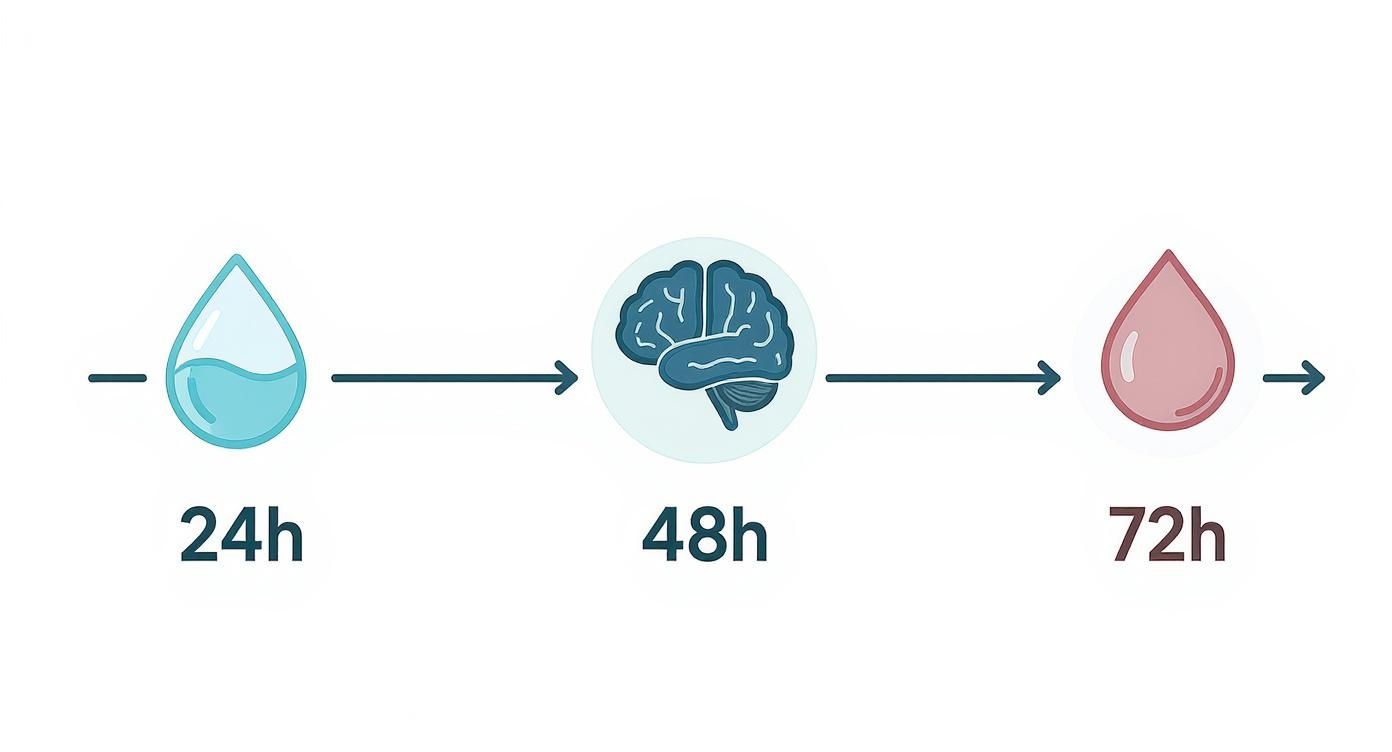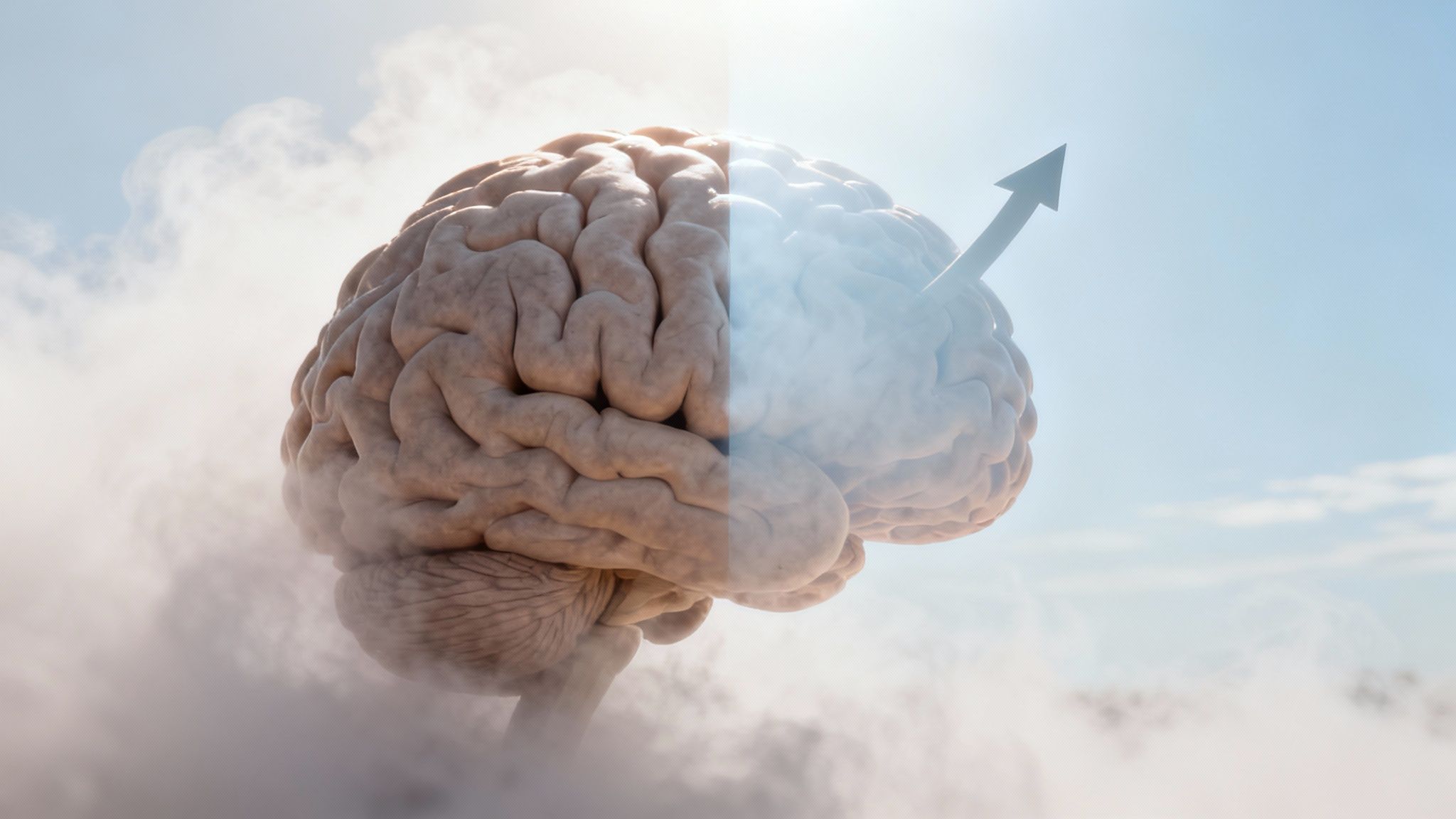
Benefits of quitting alcohol timeline: Your health gains
The rewards for quitting alcohol start showing up almost immediately. In fact, your body kicks off its healing process within the very first 24 hours. This is where your recovery journey truly begins, bringing noticeable improvements in hydration, mental sharpness, and blood sugar regulation in just the first few days.
Your Body’s First Steps to Recovery
Making the decision to stop drinking triggers a domino effect of positive changes, and the initial payoffs arrive much quicker than most people expect. Within the first 24 to 72 hours, your body dives into a critical detoxification process. It’s like a machine that’s been running on overdrive finally getting a much-needed break to perform essential maintenance.
This early period is all about your body working overtime to find its equilibrium again. One of the first things you’ll likely feel is better hydration. Alcohol is a diuretic, meaning it makes you lose more fluid than you take in. Once you cut it out, your body can finally hang onto the water it needs, which is vital for literally every function it performs.
The Dawn of Mental Clarity
As your system works to flush out the last traces of alcohol, you’ll probably feel a welcome shift in your thinking. That familiar “brain fog” that comes with hangovers starts to clear out, replaced by a growing sense of sharpness. This happens because your brain chemistry, which alcohol disrupts, begins to find its normal rhythm again. This early mental boost is a fantastic motivator for the journey ahead.
During these first few days, you might also notice:
- Stabilized Blood Sugar: Alcohol often sends blood sugar levels on a rollercoaster ride. Without it, your levels begin to even out, which can cut down on that tired, irritable feeling.
- Better Sleep on the Horizon: Your sleep might be a bit rocky at first, but your body is already laying the groundwork for deeper, more restorative sleep cycles in the weeks to come.
- Reduced Inflammation: The lining of your gut, which alcohol can seriously irritate, finally gets a chance to heal. This often leads to less bloating and general discomfort.
This initial phase sets a powerful foundation for the incredible benefits that are waiting for you. To see the full picture of what your body goes through, you can explore our science-backed sobriety guide for a detailed look at the complete alcohol recovery timeline. This is just the very beginning of a profound restoration process.
Your First Month: The Health Transformation Kicks In
Once you get past that first week, the real magic starts to happen. This first month is where you’ll likely see the most dramatic and motivating changes—the kind you can both feel on the inside and see in the mirror. It’s like your body has finished the initial emergency cleanup and is now starting a full-scale renovation, shoring up its foundations and breathing new life into every system.
With alcohol no longer in the picture, your body can finally stop putting out fires and redirect all that energy toward deep, restorative healing. The improvements you experience now are tangible proof that your hard work is paying off.
The journey begins almost immediately. Take a look at what your body gets up to in just the first 72 hours.

As you can see, the recovery process is incredibly fast. It starts with simple rehydration and quickly moves on to improving brain function and blood health in just three short days.
To give you a clearer picture of what to expect, we’ve broken down the key milestones of this initial period into a simple timeline.
Your Health Timeline in the First Month
Here’s a quick summary of the physical and mental health improvements you can look forward to during the first four weeks of going alcohol-free.
| Timeframe | Key Physical Benefits | Key Mental & Lifestyle Benefits |
|---|---|---|
| Week 1 | Hydration levels normalize, sleep patterns begin to improve after initial disruption. | Mental clarity increases, initial anxiety may subside, and you feel more present. |
| Week 2 | Liver starts shedding excess fat, digestion improves, and you may notice initial weight loss. | Energy levels become more consistent, and moods begin to stabilize. |
| Week 3 | Skin appears clearer and more vibrant, blood pressure may start to decrease. | Deeper, more restorative sleep becomes more common. Motivation and focus sharpen. |
| Week 4 | Significant reduction in liver fat, further weight loss is common, and blood pressure trends toward healthier levels. | A noticeable boost in self-esteem and a sense of accomplishment. Cravings often lessen. |
This table is a snapshot, of course. Everyone’s journey is unique, but these milestones are a great way to track your progress and stay motivated as you move forward.
Your Liver Begins to Heal
One of the most incredible turnarounds happens in your liver. Consistent drinking often causes fat to build up in the liver, which can be a stepping stone to more serious damage. But here’s the good news: within just a few weeks of quitting, your liver can start to shed this excess fat.
This isn’t just a minor tune-up; it’s a critical step in restoring your overall health. As the fat deposits shrink, your liver gets better at its hundreds of jobs, from filtering out toxins to producing vital proteins. It’s one of the first and most important wins for your long-term well-being.
Deeper Sleep and Surging Energy
While the first few nights without alcohol can be a bit rough, your sleep quality starts to seriously improve within the first month. Alcohol is notorious for disrupting the deep, restorative REM sleep your brain needs to recharge. Without that constant interference, you’ll finally start experiencing truly restful nights.
The difference is night and day. Waking up genuinely refreshed leads to:
- More energy during the day, without needing to prop yourself up with caffeine.
- More stable moods because your brain is getting the high-quality rest it craves.
- Better focus and mental sharpness that lasts all day long.
This isn’t just about feeling less tired—it’s about getting your vitality back. You’ll have the energy to fully show up for your life, whether it’s at work, with your family, or for your favorite hobbies.
Visible Rewards and Health Milestones
The benefits aren’t all happening on the inside. By the end of the first month, many people notice their skin looks healthier. Proper hydration makes your skin plumper, clearer, and gives it a natural glow.
Beyond the mirror, some major health markers start moving in the right direction. Within the first couple of weeks, weight loss is common simply from cutting out all those empty alcohol calories. For instance, if you used to drink six pints of lager a week, you’d save around 4,320 calories in a month. That adds up!
After three or four weeks, your blood pressure often starts to drop to healthier levels, which is a huge deal for reducing your risk of heart disease. These early victories are part of a much bigger picture of recovery, as your body continues to heal over the coming months. To get a more detailed look, you can explore the full timeline of what happens when you quit drinking for good and see what other milestones are ahead.
Unlocking Financial Freedom and Stronger Connections

As your body starts to heal, you’ll notice the positive effects spilling over into other parts of your life, especially your wallet and your relationships. The benefits of quitting alcohol aren’t just about better sleep or a healthier liver; they show up on your bank statement and in the way you connect with people.
Think about it: the money you used to spend on drinks was like a constant, slow drain on your finances. The moment you stop, that leak is plugged. You’d be amazed how quickly the savings start to pile up. For many, this is one of the first and most concrete rewards of going alcohol-free, offering a real incentive to keep going.
Just how much are we talking about? It’s not pocket change. Within just the second week, many people have already saved between $300 to $400. By week three, that number can easily jump to $450 to $600. That’s serious cash you can put towards a new hobby, pay down debt, or just feel less financial pressure.
More Than Money: Forging Deeper Bonds
The financial perks are fantastic, but the social benefits that come with sobriety are just as powerful, if not more so. Alcohol often becomes a social crutch, but without it, you have the chance to build relationships on a foundation of genuine connection, not just a shared habit.
Without the fog of alcohol, your conversations become sharper and more meaningful. You remember the details. You’re truly there for the people in your life, which strengthens your bonds and builds a much deeper level of trust and intimacy.
Sobriety is the ultimate social upgrade. It gives you the clarity to show up as your real self in any situation. You quickly realize you don’t need a drink to be funny, confident, or interesting—you already are all those things.
This newfound clarity also has a massive impact on your productivity and personal growth. With more energy and a clearer head, you can pour your time into things you actually care about. Maybe it’s a fitness class, a creative project, or just enjoying a quiet morning without a hangover.
You’re not just giving up alcohol. You’re gaining back your time, your energy, and the mental space to build a life that’s far more rewarding. These lifestyle shifts are a huge part of the recovery journey. To see the full picture of how your life can improve, check out our comprehensive guide on the benefits of sobriety.
Long-Term Health and Disease Risk Reduction
While the first few months without alcohol feel fantastic, the real magic happens over the long haul. Once you pass that one-year milestone, the benefits of quitting alcohol shift from quick fixes to deep, lasting protection.
Think of it this way: the early days are about patching things up. The long term is about building a fortress around your health, one that can stand up to serious threats for decades to come.
A New Lease on Life for Your Liver and Heart
Your liver, the unsung hero that processed every drink, really gets a chance to heal and regenerate now. After several months to a year, you can see dramatic improvements in liver function.
One key marker of this is a drop in GGT levels, which is a great sign that the stress on your liver is way down. You can learn more about what high levels of GGT mean for your longevity to understand just how important this is. A healthier liver is simply better at its job—filtering toxins, managing fats, and keeping you healthy.
Your heart gets a massive boost, too. Sticking with sobriety is one of the best things you can do for your cardiovascular system. Over time, you’ll likely see:
- Lower Blood Pressure: Without alcohol constantly putting a strain on your arteries, your blood pressure can settle into a much healthier range.
- Better Cholesterol Numbers: Your body gets much better at balancing triglycerides and cholesterol when it’s not fighting off alcohol.
- Reduced Heart Disease Risk: Add it all up, and you’re significantly lowering your odds of facing serious heart problems down the road.
Think of sobriety as the ultimate shield for your heart. By staying alcohol-free, you’re making a powerful, proactive choice to protect your cardiovascular health for the long run.
Slashing Your Cancer Risk
This is a big one. One of the most critical long-term benefits of quitting alcohol is a major drop in your risk for several types of cancer. Alcohol is a known carcinogen, linked directly to cancers of the mouth, throat, esophagus, liver, and breast.
The amazing part is that your risk starts to fall the moment you stop drinking, and it keeps on dropping the longer you go. After several years, your risk profile can look much closer to that of a lifelong non-drinker. It’s a direct investment in a healthier future.
A Stronger Immune System and Stable Blood Sugar
Beyond preventing major diseases, your body just runs better day-to-day. Your immune system, no longer suppressed by alcohol, becomes far more robust. You’ll probably notice you don’t get sick as often, and when you do, you bounce back faster.
Your blood sugar also finds a new, stable rhythm. Without the wild swings that alcohol and sugary mixers can cause, your body maintains a much better metabolic balance. This is especially important for lowering your risk of developing type 2 diabetes. Each year you stay sober adds another solid layer of protection, building a more resilient you from the inside out.
Your Brain’s Recovery and Mental Clarity Timeline

While your liver and heart are getting a much-needed overhaul, your brain is quietly starting its own incredible comeback story. Alcohol throws a wrench into the delicate chemical balance that runs your thoughts, moods, and ability to focus. When you stop drinking, it’s like watching a thick fog slowly burn off, revealing a sharper, more stable mental landscape underneath.
This whole process kicks off by rebalancing your neurotransmitters—the brain’s essential chemical messengers. Alcohol hijacks this system, artificially cranking up some chemicals while shutting others down, which is a major reason for the anxiety and low moods that go hand-in-hand with drinking.
The First Few Months: Reclaiming Your Balance
Within the first month, your brain gets to work recalibrating itself. Key players like serotonin (the mood stabilizer) and dopamine (the motivation molecule) start to find their natural rhythm again. This neurological reset is the cornerstone of improved mental health after you quit.
You’ll likely notice a real difference in how you feel. That constant, nagging hum of anxiety starts to quiet down, and your overall mood becomes more even-keeled. It’s not just in your head; it’s your brain chemistry physically returning to a healthier, more natural state.
Think of your brain like a finely tuned orchestra that alcohol forced to play out of key. Sobriety lets the conductor step back up to the podium, bringing each section back into harmony for a much clearer, more stable sound.
Getting good, restorative sleep is a game-changer for this healing process. If you want to dive deeper into this, you can learn more about how alcohol adversely affects sleep and see why cutting it out makes such a difference. Better sleep puts your cognitive recovery on the fast track, helping you feel sharper much sooner.
Six Months to a Year: Major Cognitive Upgrades
As you get further into your first year without alcohol, the mental perks become even more obvious. That persistent “brain fog” that might have clouded your early days lifts completely. In its place, you’ll find some seriously impressive improvements in your thinking. Your brain isn’t just healing anymore; it’s upgrading.
Here are a few of the key enhancements you can look forward to:
- Sharper Focus: Tasks that used to feel overwhelming become easier to tackle as your ability to concentrate returns with a vengeance.
- Enhanced Memory: You’ll find it much easier to recall things, from what you needed at the grocery store to important memories that once felt fuzzy.
- Better Problem-Solving: With a clearer head, you can navigate complex challenges at work or at home with less stress and more creative solutions.
This lasting mental clarity is truly one of the most empowering rewards of going alcohol-free. It allows you to be more present in your own life, make decisions with confidence, and finally build a future based on what you’re truly capable of, without alcohol holding you back.
Common Questions About Quitting Alcohol
Deciding to quit drinking is a huge step, and it’s totally normal for a lot of questions to pop up. Feeling prepared can make all the difference, helping you turn potential roadblocks into real moments of growth.
Let’s walk through some of the most common things people wonder about when they start this journey.
What Are the Hardest Parts of the Quitting Alcohol Timeline?
No sugarcoating it—the first one to two weeks are usually the toughest. This is the period when your body is going through physical detox, which can bring on withdrawal symptoms and some pretty intense cravings. At the same time, your brain is working hard to break a deeply ingrained habit.
Social situations can also feel like navigating a minefield at the beginning. But here’s the good news: it gets so much easier. As your body heals, you’ll naturally start to build new, healthier ways to cope. Building that solid foundation early on is everything, and our guide on how to quit drinking has practical strategies to get you through it.
Will I Lose Weight Automatically If I Stop Drinking?
It’s a really common outcome. When you think about it, alcohol is packed with “empty calories”—calories that give you zero nutritional benefit. A single pint of beer can easily top 200 calories, and a few of those add up faster than you’d think.
While dropping pounds isn’t a guarantee for everyone, sobriety sets the stage for it beautifully. When you stop drinking and combine it with a balanced diet and regular movement, you’ve got a powerful recipe for managing your weight and boosting your overall health.
How Long Until Brain Fog Clears?
This varies for everyone, but most people start to feel the fog lifting in a noticeable way within the first two to four weeks. It’s often one of the first and most rewarding changes people experience.
But it doesn’t stop there. The real magic happens over the next few months. You can expect to see ongoing improvements in memory, focus, and problem-solving abilities over the first three to six months as your brain gets busy repairing neural pathways.
How Do I Handle Social Events Without Drinking?
This is a big one for almost everyone. The key is to have a plan before you walk in the door. A little preparation goes a long way in making you feel confident and in control.
Here are a few simple tips that work wonders:
- Have your drink order ready. Walk in knowing you’re getting a sparkling water with lime, a club soda, or a cool mocktail. No hesitation needed.
- Plan your exit. It’s okay to not be the last one to leave. Give yourself permission to head out whenever you feel like it.
- Focus on people, not drinks. You’ll probably find you have much better conversations when you’re clear-headed. The real point of socializing is connection, after all.
At Soberly, we’re here to support you every step of the way. Our app gives you the tools to track your progress, build healthier habits, and celebrate every single win on your journey to a more fulfilling life. Download Soberly today to get started.